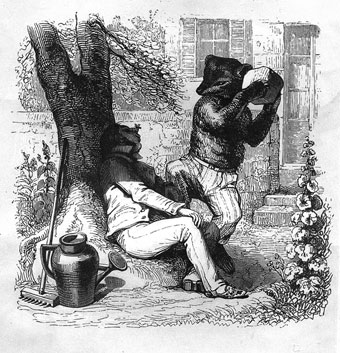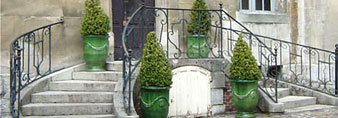Fable, Jean de La
Fontaine,
Book VIII,
fables 10, 11, 12, 13 |
| |
THE BEAR AND GARDENER. (VIII,10)
A certain highland half-licked bear,
His fate confined within a lonely wood ;
A new Bellerophon,* he wandered there,
Till grown a fool : Reason, 'tis understood,
Romains not with sequestered people long.
'Tis right to speak, better to hold our tongue,
But carried to excess, they both are wrong.
No business led a beast to stray
Where Bruin spent the weary day ;
Bear therefore as he was, at last
His days all slow and dreary passed.
Not far from him, a certain man in years
Was just as sad, though free from cares.
He, Flora and Pomona's priest,
On gardens ever loved to feast
Delightful task, but with it I would blend
The bliss of some instructive tender friend.
Gardens, except in books, but little say---
So that our lonely man one day
To all his silent borders bid adieu,
And to procure some friend set off from home. –
The bear, who formed the same intention too,
Had just forsook his wood to roam,
And, what is more surprising yet,
Both turning round a corner met.
The man turned pale—but how retreat or pass ?
The Gascon he must act, or die an ass.
Wisely he therefore seemed of nought afraid.
The bear, at compliments but awkward, said
" Come home with me."—The man replied :
" My lord, You see my house, if you will honour me
To share the homely fare it may afford
Of fruits and milk—which, though it may not be
The food * your bristly lordships daily eat,
'Tis yours, my lord."—The bear approved the treat.
Homeward they went, good friends, along the road.
They both seemed happy in the man's abode;
And though far better, in my rule,
To be alone than with a fool,
As Bruin never spoke two words a day,
The man in silence worked away.
Bruin for hunting had acquired some fame,
And every night brought home a store of game.
He also gave to flies successful chase,
And kept them from his sleeping neighbour's face.
One day his friend was in profound repose,
When one of these sat sporting on his nose.
Bruin in vain to chase him tried :
" I'll have thee somehow or somewhere," he cried.
He said, and seized a stone, which straight he threw
Against the fly, and broke his neighbour's skull.
A clever marksman, but in logic dull :
He crushed the fly, and killed his neighbour too.
Better a foe, if wisdom be his lot,
Than make a friend of such a stupid sot.
* The common bear is frugivorous |

|
THE TWO FRIENDS.(VIII,11)
In Monomopata of old there dwelt
Two friends, who smoothly passed their time away :
Their wealth was joint, each other's cares they felt.
Friends in that country equal ours, they say.
One night, while darkness veiled the sky,
And closed in slumbers every eye,
One of our friends arose, with fright appalled,
Flew to the other's gate—the servants called.
Morpheus had touched the threshold with his wand.
His friend, alarmed, in haste sprang out,
Quick seized his purse, and sword in hand,
The other joined, and said : " You run. about
But seldom in the hours of sleep,
I know that you to wiser order keep :
Have you lost all your money then at play ?
Here's more :—or have you had some quarrel, say ?
I have my sword along ! perhaps you're sick
Of sleeping by yourself, just in the nick
" I have a. pretty slave." His friend said : " No,
To none of these this midnight call you owe.
Your zeal receives my warm applause.
While sleeping, you seemed mournful to my view ;
I ran to see if what I feared were true.
The unlucky vision is the cause."
Reader, in which did friendship brighter shine ?
A pleasing difficulty to define.—
How great a treasure is a friend indeed !
He searches through your heart to know your need,
..Spares you the trouble even to tell
What he himself finds out as well :
A dream, a look, a nought gives fear,
When for a friend or object dear. |
|
THE HOG, SHE-GOAT, AND SHEEP(VIII,12)
A Goat, a sheep, and hog with bacon rare,
Together in a cart went to the fair ;
But 'twas not their diversion led them there.
Like other goods, they were for sale, we find.
The carter did not mean, the story goes,
To treat them there with Merryandrew * shows.
Don Porkey cried, as if his haunted mind
Had seen a hundred butchers close behind.
His clamours, loud enough to split the ear,
Struck his two fellow-travellers mild with fear ;
And much they wondered what might him alarm,
..........As they perceived no danger near,
" Porkey," the carter cried, " what does thee harm ?
Thy deafening voice is all that we can hear :
Learn from thy worthy friends, who make no noise,
If not to live, at least to rule thy voice :
See the good sheep, so quiet and so cool,
So well-behaved." " Because he is a fool,''
Replied the hog ; " but if he knew his lot,
He'd cry with me, with all his power of throat ;
And that great personage so finely bred,
Would roar with all his length of beard and head.
Sheep dream of shearing, goats of being milked,
Ours little think that they may both be bilked.
But be their expectations bad or good,
I know that I am only fit for food :
My death is certain, and I see it nigh ;
Adieu, my roof ! adieu, my pleasant stye ! "
Don Porkey reasoned with uncommon skill,
But to what end ? against a certain ill.
Nor fear, nor wailing, changes Fate's decrees,
And he is happiest who the least foresees.
* In original Tabarin, a notorious servant of a quack in the beginning of the seventeenth century |
DAMON AND PHILLIS, (VIII, 13)
To Mademoiselle de Sillery
......Aesop I had laid aside
With Boccace t all occupied ;
But a goddess hark invite
Me to Mount Parnassus' plain,
With new fables of my brain;
Nor may I the summons slight.
If I give not reasons grave,
Mortals cannot thus behave,
When the goddesses excite ;
Above all, when every air
Marks the fairest of the fair,
Forms a queen our will to reign.
Know then all, that Sillery
Wears the charm that wins on me.
Sillery invites again
My old actors to the plain,
Dread Sir Wolf, and Mister Crow ;
Scene, the wood, or den, or fold,
She is named, and all is told.
All lier taste, admiring, know ;
All she fills with high esteem ;
All allow her worth supreme.
Such is she—who can withstand ?
Haste we then to what's in hand :
She declares my Tales t obscure.
Minds so delicate and pure
Do not all recitals seize;
Let us try some where she may
Catch the sense with greater ease.
Let's bring the shepherds then, and rhyme away
On what the wolves and sheep between them say.
Damon to blooming Phillis cried one day
" Ah! if like me a certain plaint you knew,
A plaint which pleases and torments us too,
No earthly good could equal it to you!
Let me explain it to you, lovely maid ;
Believe me, you may hear it unafraid ;
Would I deceive you ?—you to whom I swear
The tenderest passion of a heart sincere ? "
When Phillis quick exclaimed
"What do you Gall it?pray, what is it named ?
Love.-Pretty word.-But pray some marks reveal,
That I may know it-what is it they feel ?"
" Pains, matched with which the pleasures of a throne
Are dull and low ;-we're absent-in a maze‑
Well pleased we haunt the woods alone.
......If in the glassy stream we gaze,
Ourselves we see not—‘tis a shade that flies,
Returns, and follows us through all our ways ;
In fine, a lover, Phillis, has no eyes.
There is a shepherd close our village by,
Whose sight, or voice, or name, the blushes raise ;
The thoughts of him deep sighs excite,
Unknown to maids the reason—yet they sigh ;
They dread to see him, yet desire his sight."
Phillis exclaimed, with sparkling eye
" So !-that's the pain, at last, you've dwelt upon?
To me no news, I think, nor yet unknown."
Damon with listening expectation hung,
When the nymph added: " You've exactly guessed
What I for Corydon have felt so long."
He almost died, with spite and shame oppressed.
Thus many like him do their best,
Thinking the’re acting for themselves alone,
While all they do is but for others done. |
|
|
|



